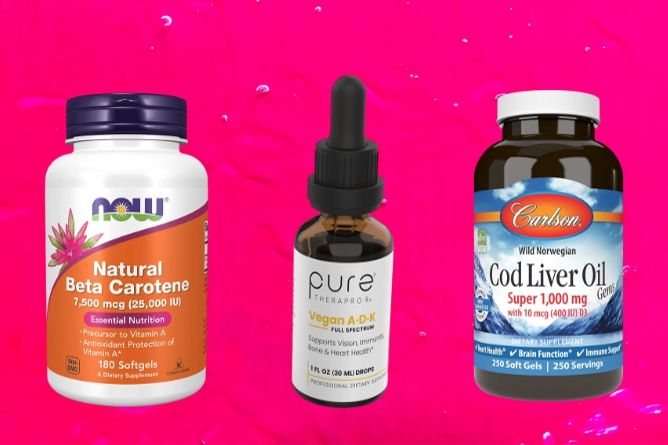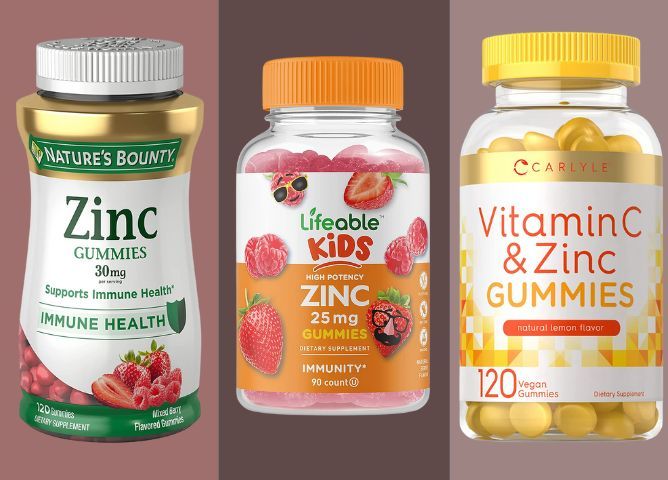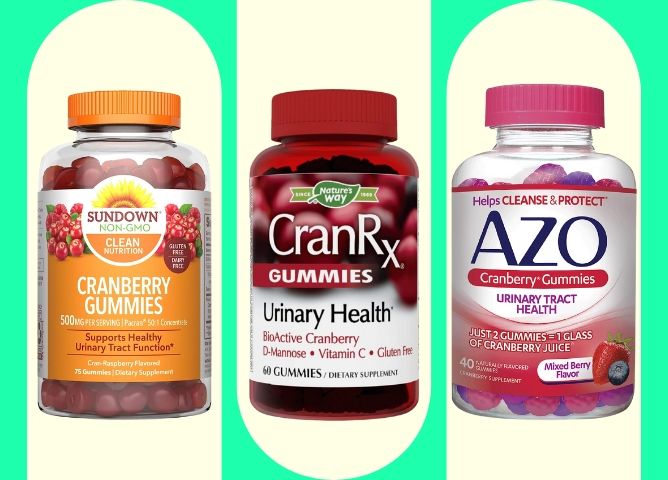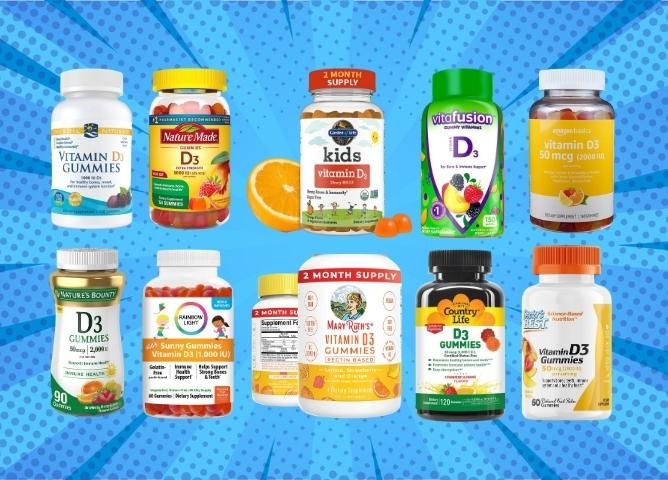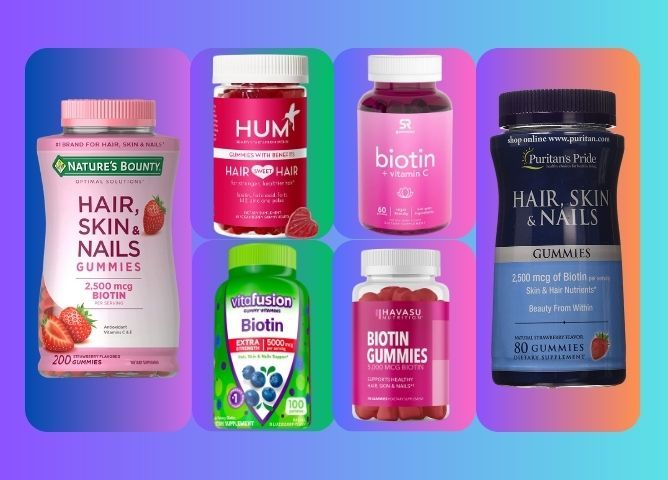In This Article
This post may contain affiliate links, please see our privacy policy for details.
Are you looking for the perfect way to stay healthy and vibrant? Look no further than vitamin A supplements! In this blog post, we'll discuss their importance, provide a breakdown of different types and their benefits & drawbacks - plus tips on finding an affordable yet effective supplement. Get the inside scoop now and start feeling your very best!
What is Vitamin A?
Vitamin A is an essential, fat-soluble vitamin that our bodies need to maintain healthy eyesight, skin complexion, immune system function, and more. It can also aid in reducing inflammation and promoting overall health and well-being. However, it can be difficult to get enough of it from food alone, which is why many people opt for taking a supplement in order to ensure they are getting the recommended dietary allowance for this important vitamin.
Different Types of Vitamin A Supplements
There are several types of vitamin A supplements available on the market today. These include retinol (the natural form found in foods), beta carotene (which is converted by the body into retinol), synthetic forms such as palmitate or acetate, as well as plant-based/vegan sources like algae or seaweed extracts. Each type has its own pros and cons that need to be evaluated before deciding which one may be most appropriate for you.
The Benefits of Vitamin A
Vitamin A is important for both vision health as well as immunity. It helps to strengthen the eye muscles vital for good vision and it also helps with cell growth which improves immunity against viruses and bacteria. Taking a vitamin A supplement ensures that you get enough of the essential nutrient without having to overconsume foods that are high in them such as liver, eggs, carrots, and spinach.
Other benefits include improved skin health, prevention of age-related macular degeneration and premature aging, promoting of cell growth and differentiation throughout the body, fostering strong bones and teeth, helping reduce inflammation response in the body, regulating hormones such as thyroid hormone production (important for maintaining energy levels), aiding in weight management by stimulating metabolic activity and helping fuel physical activities (ideal for those who work out or exercise regularly).
Drawbacks of Taking Too Much Vitamin A
Although vitamin A is an important nutrient there are some potential drawbacks associated with taking too much of it. This includes hair loss due to excessive amounts in the bloodstream (a condition called hypervitaminosis), increased risk of birth defects when taken during pregnancy (so always consult your physician before taking any type of supplementation while pregnant), liver toxicity if taken with other medications like acetaminophen or ibuprofen, etc., and vomiting/nausea if dosage amounts exceed recommended limits.
Tips For Getting The Most Out Of Your Supplement
When considering taking a vitamin A supplement there are a few tips to help ensure you get the maximum benefit from it:
- Ensure that you’re getting a quality product (look for verifiable third-party test results on reputable brands) take it with food as this helps absorption;
- Store away from light heat oxygen; do not exceed recommended dosage unless instructed by a doctor;
- Remember to take it every day consistently;
- Read labels carefully when selecting different products such as multivitamins;
- Consider taking other crucial nutrients like omega 3s zinc folate etc depending on individual needs;
- Ask your doctor about further supplements like calcium iron etc if desired;
- Track progress by keeping notes on how you feel overall while taking a supplementation regimen especially if symptom relief was expected at certain dosages levels;
- Adjust dosage accordingly after consulting with the physician;
- Consider checking blood work done regularly every 6 months – 1 year depending on individual needs and habits.
Choosing the Right Supplement For You
When it comes to taking a Vitamin A supplement, it’s important to choose one that is safe and effective for your body. There are a variety of different forms of Vitamin A available on the market that can range from synthetic or natural sources, but which one is right for you?
Vitamin A plays an essential role in promoting healthy vision and preventing eye diseases. It also helps keep your immune system functioning properly, keeps skin healthy, and even helps with fertility. To get the most out of your Vitamin A supplement, it’s important to understand how different forms of Vitamin A affect our bodies.
Synthetic Vs. Natural Sources
The two main forms of Vitamin A on the market include synthetic sources (such as retinyl acetate) and natural sources (such as beta carotene). Synthetic Vitamins are derived from chemical compounds while natural vitamins come directly from plants or animals. it's important to understand the pros and cons of each option so you can determine what type will be best for you.
Synthetic
Synthetic Vitamin A supplements use chemicals like retinyl acetate which are easily absorbed by the body. They are less expensive than natural products, have a longer shelf life when stored correctly, and can be taken in higher doses than natural sources if recommended by a physician. However, synthetic versions may not be as bioavailable when compared to their natural counterpart due to potential side effects including nausea, headaches, and skin irritation—especially at high doses.
Natural
Natural Vitamin A supplements come from either animals or plants such as liver or carrots respectively. These are usually more expensive than synthetic options but they tend to be better tolerated in the body because they don't contain any harsh chemicals as synthetic vitamins do. Additionally, these forms of Vitamin A have been found to be more readily available in the body due to their naturally occurring antioxidants—which help fight off free radical damage that occurs over time due to environmental factors like pollution, stress, and poor diet choices.
Understanding Your Needs
It's also important to consider your individual needs when choosing a vitamin supplement, specifically how much you need per day based on age and gender, any health conditions you may have, and lifestyle habits such as smoking or drinking alcohol regularly—all of which may require additional supplementation beyond what is considered a “normal” dosage for an adult person between 18-50 years old (2-4 mg).
Additionally, foods rich in beta-carotene provide an adequate supply although not enough for those with higher requirements due to medical issues like celiac disease or cystic fibrosis which require higher intakes of Vitamin A making supplementation necessary instead relying solely on food sources alone.
Lastly, always speak with your doctor before beginning any new supplement regimen especially since some high doses can be toxic if taken without prior consultation with a medical professional - plus everyone's body is different so it's beneficial to get advice tailored specifically towards your needs rather than just randomly choosing a vitamin off the rack at your local pharmacy!
Taking all this information into consideration should make selecting the perfect choice easier knowing it’s tailored exactly to what will work best for you!
Our Favorite Vitamin A Supplements To Try
It can be hard to choose the right Vitamin A supplement for your body. There are so many different forms of Vitamin A available on the market, from synthetic sources to natural sources. But which one is right for you?
We’ve put together this list of our favorite Vitamin A supplements from Amazon to help you make an informed decision. With options ranging from affordable and effective to top-tier products with additional benefits, there’s something here for everyone.
Bronson Vitamins Vitamin A
Bronson Vitamins is a company that manufactures its products in a line with Good Manufacturing Practices (GMP).
The Vitamin A soft gels contain soybean oil, gelatin, glycerin, purified water, and other ingredients.
Each serving provides 333% of the Daily Value for Vitamin A in RAE, making it an excellent choice for supporting vision, immune health, healthy growth & reproduction.
It is highly potent, with 10,000 IU in every single soft gel capsule. Plus, the product is laboratory-tested and non-GMO.
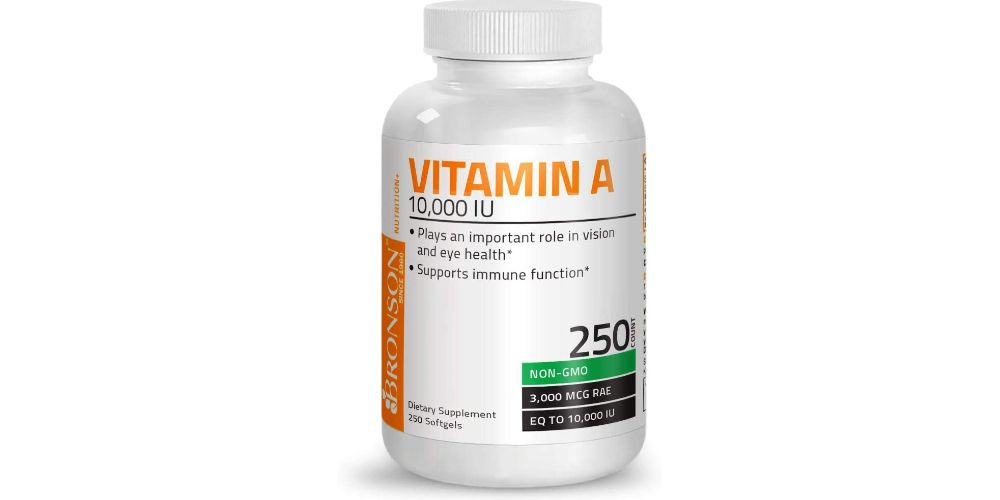
Now Foods Beta Carotene
Now Foods Beta Carotene is an affordable, plant-based form of Vitamin A that's perfect for those who want a naturally sourced supplement.
The capsules contain generous amounts of beta-carotene which supports eye health, boosts immunity, and protects cells against oxidative damage—all while offering skin benefits as well!
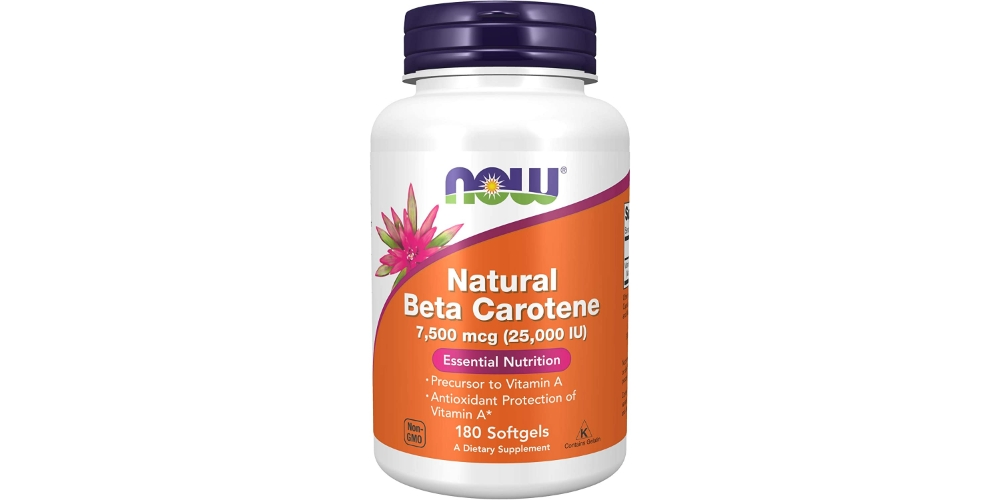
Pure TheraPro Rx Vegan A-D-K Full Spectrum Drops
This vegan supplement offers three fat-soluble vitamins--Vitamins A, D, and K--in a convenient liquid form.
It is third-party tested and free of soy and genetically modified organisms (GMOs) as well as fillers, containing only some added fat which helps the body better absorb the fat-soluble vitamins.
The supplement utilizes two forms of Micellized Vitamin A (palmitate and betacarotene), VEGAN Vitamin D3, plus two essential forms of K2 (MK-4 + MK-7). Vitamin D helps the body absorb calcium, while Vitamin K2 works to ensure that calcium is appropriately utilized in bones instead of soft tissue or organs.
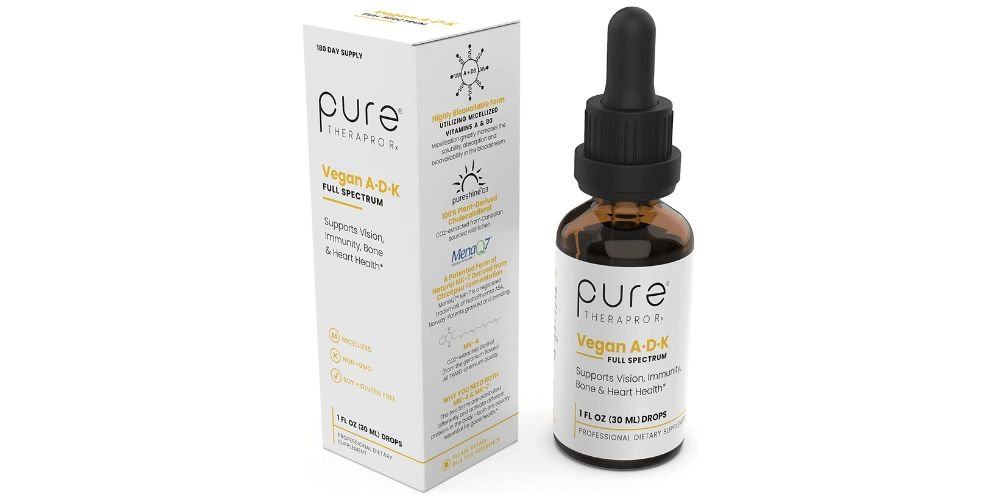
Nordic Naturals Arctic Cod Liver Oil
Nordic Naturals is one of the most trusted omega-3 fish oil brands on the market and their cod liver oil is equally high quality. Not only is it third-party tested for purity, but it's also sustainably sourced from Atlantic cod.
The supplement contains just three ingredients--cod liver oil, antioxidant alpha-tocopherol, and rosemary extract as a natural preservative--with one serving containing 4% of the Daily Value for Vitamin A.
To make it more palatable, the product comes in flavors like lemon, orange, and strawberry.
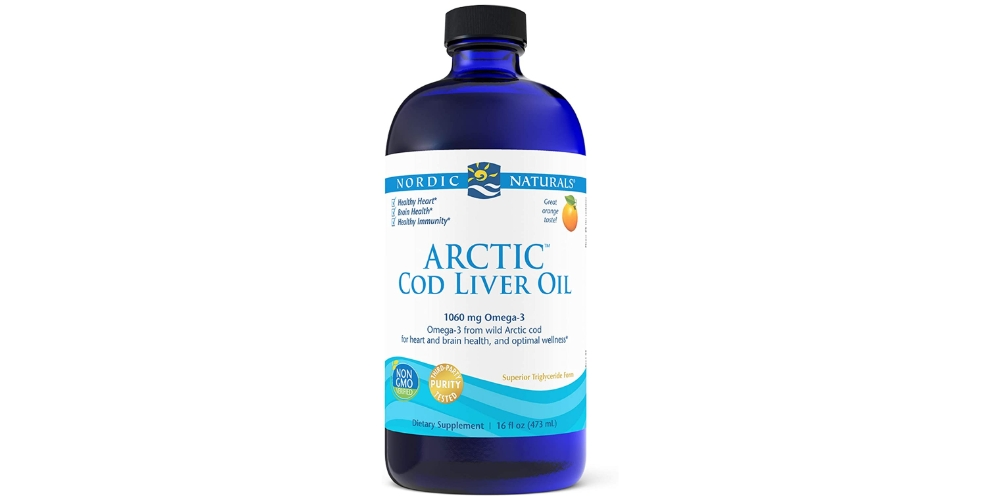
Carlson Cod Liver Oil
If you're looking for a comprehensive solution in one easy-to-swallow capsule, then Carlson's soft gels might be a perfect choice.
They contain high potency levels of both vitamin D3 (400 IU) and A (2,000 IU), making them ideal for those who don't get enough time outside in the sun or consume leafy greens daily.
This cod liver oil is IFOS Certified and non-GMO, making it suitable for those seeking to increase their intake of cod liver oil vitamins for improved immune function.
In addition to vitamin D, vitamin E, and omega-3 fats, this supplement contains 67% of the Daily Value for Vitamin A per serving.
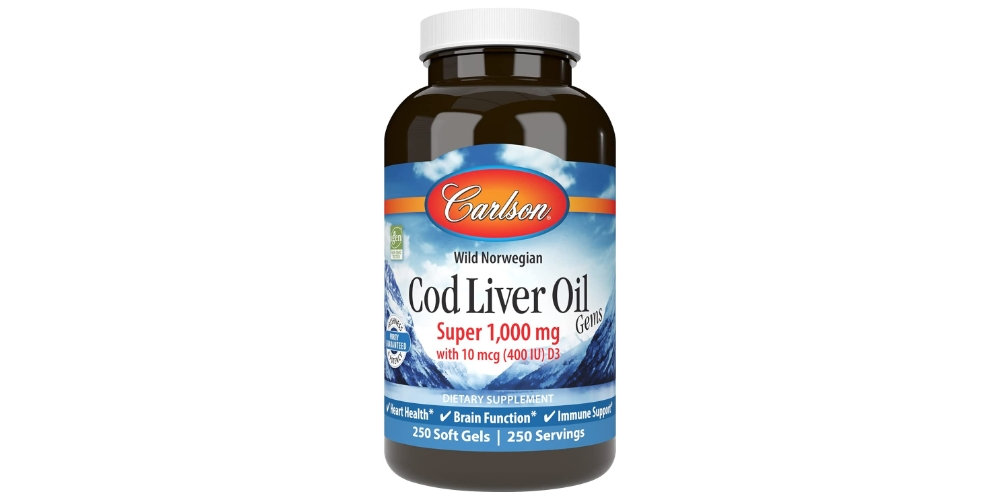
NOW Foods Vitamin A (Fish Liver Oil)
This supplement from NOW Foods contains a simple, straightforward list of high-quality ingredients, such as Vitamin A from fish liver oil and soybean oil to improve absorption.
It provides 833% of the Daily Value for Vitamin A per serving, is non-GMO and free of soy.
Additionally, NOW Foods has been certified by Underwriters Laboratories (UL), the reliable third-party organization that ensures companies adhere to good manufacturing practices.
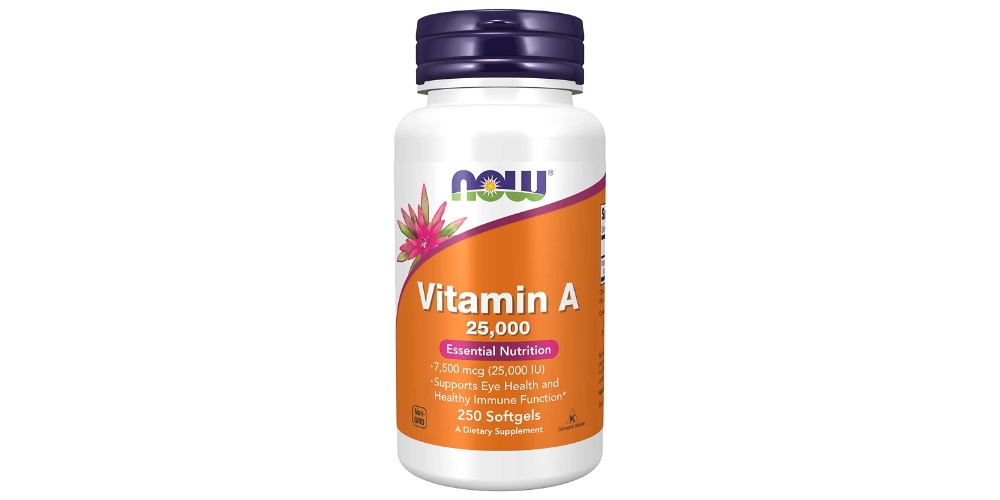
Best Vitamin A Supplements FAQ
How Much Vitamin A Should I Take?
The Recommended Daily Allowance (RDA) of Vitamin A for adults is 900-3,000 mcg. For adult men between 19–70 years old, the RDA is 900 mcg/day; while women in that same age group require 700 mcg/day.
Pregnant and breastfeeding women need the same amount. Children need much less Vitamin A (300–600 mcg/day) and premature babies may need up to 4500 mcG per day due to their low body stores of Vitamin A. It’s important to be aware of the upper safe limit set at 10,000 mcg/day for adults over 18 years old by the IOM, with a recommended dose of no more than 4500 mcG/day even if advised otherwise by a doctor.
To ensure optimal health, it's best to get enough Vitamin A from food sources like carrots and sweet potatoes before considering supplements as too much can be toxic and cause negative side effects.
What is Preformed Vitamin A?
Preformed Vitamin A, also known as Retinol, is an essential nutrient found in animal sources like the liver and eggs. It plays a critical role in maintaining healthy vision, bone growth, cell division and differentiation, gene expression regulation, hormone production, and antioxidant function.
Humans can absorb this directly as well as through the conversion of food-sourced beta-carotene via enzymes such as beta-carotene 1515. If too much is consumed there may be adverse health effects due to the accumulation of the compound causing oxidative stress. Dietary sources or supplements can provide enough preformed vitamin A to meet individual requirements.
What are Retinol Activity Equivalents (RAE)?
Retinol Activity Equivalents (RAE) are the measure used for preformed vitamins in supplements, as well as for natural sources such as food. One RAE of Vitamin A equals 1 microgram of retinol, 2 micrograms beta-carotene, or 12 micrograms of another provitamin A carotenoids.
Which Supplement Form Should I Choose?
Choosing the right vitamin or mineral supplement form is important as it can affect how quickly your body absorbs and uses them. Consider convenience, health goals, and interactions with other medications when making this decision.
Capsules offer high concentrations in easy-to-swallow doses, while tablets are cheaper and provide even spread throughout the day.
Liquid forms have fast absorption but short shelf lives and may contain soybean oil so should be avoided if there is an allergy to it.
Soybean oil is commonly used to help absorb fat-soluble vitamins such as Vitamin A and therefore may be included in some supplement formulas.
Speak with a healthcare practitioner before deciding as individual lifestyle habits and health goals vary.
Final Thoughts
Making sure to choose the right form of Vitamin A supplementation is key to ensuring optimal health benefits and achieving desired results when taking dietary supplements—and now with so many choices available on Amazon narrowing down your selection process has never been easier!
We’ve highlighted great options with varying levels of potency and delivery methods to make sure everyone finds something suitable for their specific lifestyle.
Remember to always check product labels carefully before making any purchase and consult with a healthcare professional if needed. With proper research and preparation, you should have no trouble finding the right supplement for your dietary routine!


